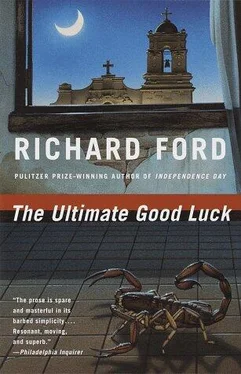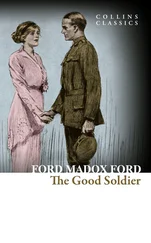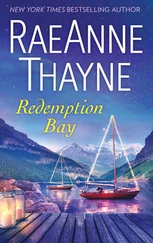Richard Ford - The Ultimate Good Luck
Здесь есть возможность читать онлайн «Richard Ford - The Ultimate Good Luck» весь текст электронной книги совершенно бесплатно (целиком полную версию без сокращений). В некоторых случаях можно слушать аудио, скачать через торрент в формате fb2 и присутствует краткое содержание. Год выпуска: 2010, Издательство: Vintage, Жанр: Современная проза, на английском языке. Описание произведения, (предисловие) а так же отзывы посетителей доступны на портале библиотеки ЛибКат.
- Название:The Ultimate Good Luck
- Автор:
- Издательство:Vintage
- Жанр:
- Год:2010
- ISBN:нет данных
- Рейтинг книги:5 / 5. Голосов: 1
-
Избранное:Добавить в избранное
- Отзывы:
-
Ваша оценка:
- 100
- 1
- 2
- 3
- 4
- 5
The Ultimate Good Luck: краткое содержание, описание и аннотация
Предлагаем к чтению аннотацию, описание, краткое содержание или предисловие (зависит от того, что написал сам автор книги «The Ultimate Good Luck»). Если вы не нашли необходимую информацию о книге — напишите в комментариях, мы постараемся отыскать её.
"His prose has a taut, cinematic quality that bathes his story with the same hot, mercilessly white light that scorches Mexico."-
The Ultimate Good Luck — читать онлайн бесплатно полную книгу (весь текст) целиком
Ниже представлен текст книги, разбитый по страницам. Система сохранения места последней прочитанной страницы, позволяет с удобством читать онлайн бесплатно книгу «The Ultimate Good Luck», без необходимости каждый раз заново искать на чём Вы остановились. Поставьте закладку, и сможете в любой момент перейти на страницу, на которой закончили чтение.
Интервал:
Закладка:
Out in the street he saw the American girl’s pink hot pants. They weren’t on her now but were wadded into the muffling system of the taxi that had been blown over. He couldn’t see the girl, though he saw her father, twenty meters down Independencia lying in a clutter with his white T-shirt blown off his shoulders and his skin blacked and starting to bleed. There was more screaming as more became visible in the street. The siren noise became more intense and nearer. Soldiers were coming from all directions, running with their M-16s ready at their shoulders, approaching heavy-footed and knee-bent as though they were receiving fire from somewhere, their mouths closed and drawn back, ready to shoot somebody.
He felt himself suddenly lose breath. His legs became awkward and painful, and he knew it was the way you felt just before you got shot, ultimate vulnerability. He thought about his gun, about the precise location of it in the bungalow, and the good it would do him to have it right now. None.
He knelt beside the American on the sidewalk and discovered his daughter was under him, odd-shaped and missing most of the part of her where her shorts had been. Her father was making a big blood bubble out of his mouth. They were both dead. He stood up and looked quickly for the wife, tried to find her white blouse in the rubble, but couldn’t see her. The dog was sitting alone in the opening where the Baskin-Robbins had been. The woman could’ve been sheltered, he thought, but he didn’t see how. Articles of clothing and peelings off the ice-cream machines were blown out into the street as though the explosion had curved as it went outward, throwing as much down-street as directly across toward the park. It made everything the same.
People were yelling in Spanish now very fast and loud, something he couldn’t understand, that sounded like “I own her.” He walked back into an area of sidewalk that was suddenly deserted, and he felt all at once that he was conspicuous and shouldn’t be here and shouldn’t let himself be separable at all. There was a theory for that too. Trucks were approaching. He could hear them straining gears. The sidewalk began vibrating. He posed an unreasonable risk now. On the front of the chiropractor’s building was the long red and black boxing poster he had seen all week and that had not been touched. It showed two giant black boxers with their fists clenched in fight postures above the words “Sin Empate, Sin Indulto.” No Holds Barred.
Soldiers had begun forcing people away from the Baskin-Robbins, pushing some unselectively, face-first into the wall of the chiropractor’s building using their gun barrels, and kicking them in the hamstrings and yelling. The soldiers thought the bomber was on the scene and they were going to catch him, and Quinn knew if he didn’t walk off the open sidewalk at that moment they would see him and take that occasion to arrest him. Firemen had begun covering the taxi with AFF foam, getting it on everything including the soldiers, who began kicking the people against the wall harder and pushing more people into line. The rag figures were covered, and he realized now he couldn’t tell the woman from the mop boy if he found her. The commotion was maddening and all around, and he walked out into the Avenue Independencia and into the park through the crowd at the curb, away from where the soldiers were yelling and kicking people in the back.
Rae was alone on the bench, the zócalo having emptied. The cab drivers and shine boys had all run out across Hidalgo, leaving their cabs and their chairs warming in the sun. They stood inside the shadows of the Portal with the tourists, whispering and gesturing toward the uproar. Rae sat facing the Baskin-Robbins, which was, except for two circus bubbles hung high on the building’s façade, completely flocked in foam.
Quinn sat down without speaking and stared at the plaza. And for a moment, sitting in the sunlight beside Rae in the consoling wake of violence, he felt insulated from trouble, almost drowsy in the warmth of the afternoon. A monotony anyone could get inside of, anyone could feel safe in.
“Didn’t you see me waving?” Rae said, her voice cheerful, though not looking at him. “I stood up on the bench and waved at you. I thought you saw me. You looked like you did.”
“I saw you fine,” he said. He let the drowsiness come down on him.
“Then you’re just a stupid fuck, aren’t you?” she said, her voice not steady now. She looked at him, her face wild. “It’s the oldest trick they know. Set a bomb and three minutes later set another one, and you get the police and all the other stupid assholes.” She shook her head. Her hair was damp. “You’re fucked up. You’re just fucked up. Didn’t they teach you anything in the marines?”
“They lit that girl up,” he said. Sirens were very near and more police whistles echoed through the empty park. There was a sudden, sharp pocking noise, close in, very fast, an M-16 going off at full, the familiar, unreverberating plastic noise, like a fire-cracker going off underwater. It wasn’t a bothersome sound.
Rae stamped her foot on the pavement. “What happens to me?” She looked away from him fiercely. “You tell me, all right? What in the hell happens to me if you get blown up?”
He stared in the direction of the automatic weapons fire. It came from toward the Reforma. The soldiers had somebody trapped and were free-firing in on top of them. It began to be intense. “There’s no way in hell those people could’ve expected that,” he said.
Rae stared at him strangely. “What’s the matter with you?” she said, unable to keep her head still.
“Not anything,” he said. He felt tense now and his legs trembled. It wasn’t a bad sign to tremble, it meant you were alert, and you needed to move. “I didn’t see it right, that’s all,” he said.
A green and white ambulance truck turned onto the Avenue Hidalgo and idled along the perimeter of the park. The driver pointed to them for someone in the back of the truck, who suddenly peered out through the window. A two-way radio crackled inside, and the man in the window said something to the driver and the truck speeded up.
“Everything’s gone so bad,” Rae said. She was squeezing her hands in her lap. “I really can’t do this.”
“Yes you can,” he said. “You certainly can. Let’s get up.” He heard more pocking sounds — thick, padded noises from streets much nearer. Something in the nearness alerted the soldiers in front of the Baskin-Robbins, and they began running toward the noise, their legs webbed with foam, their helmets and canteens bouncing, crouched in anticipation of shooting. The people against the wall began to stray away unhurriedly. It made him feel safe not to be interesting to soldiers or ambulance drivers. “Just stand up,” he said. He stood and felt lightheaded.
“There’s no place to go,” Rae said helplessly.
“Yes there is, so just get up. It’s fine.” Water beat loudly in the fountains and the thop-thop of a helicopter somewhere too high in the haze to see began buffeting the ground. People in the Portal were staring at the sky.
“This is stupid,” Rae said. “This is all very stupid.” She was starting to cry.
“No it’s not,” he said. “It all makes perfect sense.” He looked around the empty park. A green parrot stood out on the hot pavement perfectly still, its red target eye blinking at the sunlight. He took Rae’s hand.
17
ALL THE COMMERCIAL STREETS up Cinco de Mayo had emptied. No one cared to be on the street with soldiers, and the siesta had begun. Every two minutes a blue minibus would swarm by with its flasher spinning, and disappear into the Colonia La Paz, where shooting was still going, leaving the streets back toward the Centro silent and restricted. Whatever had made Quinn quease up yesterday had begun to stroke again, and he was having to down pills to keep his stomach from involuting. He didn’t want that trouble and he thought he could worry about the long-term later.
Читать дальшеИнтервал:
Закладка:
Похожие книги на «The Ultimate Good Luck»
Представляем Вашему вниманию похожие книги на «The Ultimate Good Luck» списком для выбора. Мы отобрали схожую по названию и смыслу литературу в надежде предоставить читателям больше вариантов отыскать новые, интересные, ещё непрочитанные произведения.
Обсуждение, отзывы о книге «The Ultimate Good Luck» и просто собственные мнения читателей. Оставьте ваши комментарии, напишите, что Вы думаете о произведении, его смысле или главных героях. Укажите что конкретно понравилось, а что нет, и почему Вы так считаете.







![Theresa Cheung - The Dream Dictionary from A to Z [Revised edition] - The Ultimate A–Z to Interpret the Secrets of Your Dreams](/books/692092/theresa-cheung-the-dream-dictionary-from-a-to-z-r-thumb.webp)




